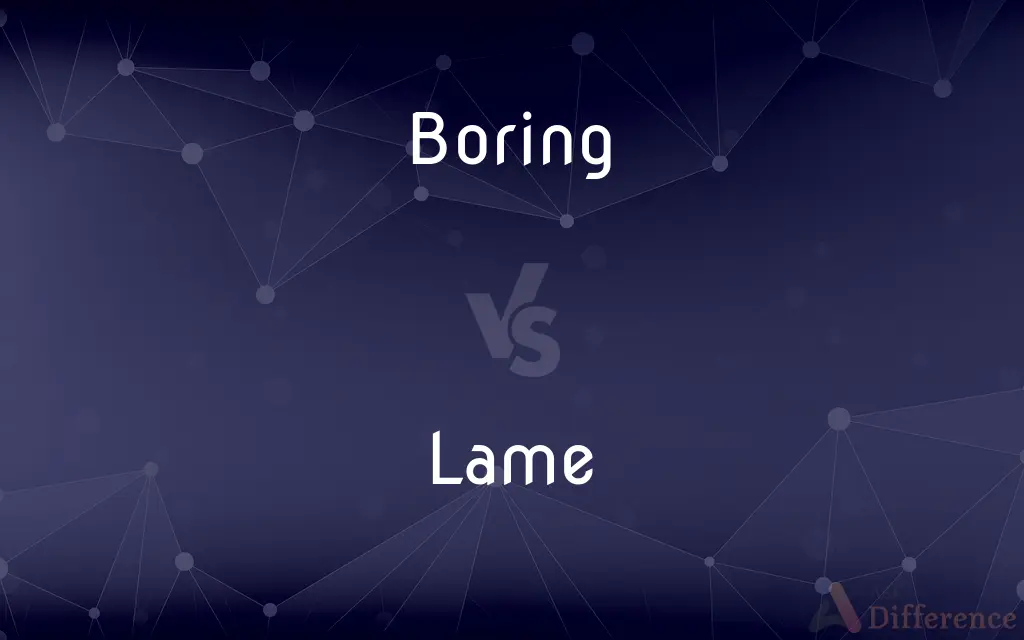Boring vs. Lame — What's the Difference?
By Tayyaba Rehman & Fiza Rafique — Updated on May 8, 2024
"Boring" means lacking interest or excitement, while "lame" is slang for something unimpressive or uncool. Both describe undesirable experiences, but "lame" can imply social disapproval, whereas "boring" just signifies dullness.

Difference Between Boring and Lame
Table of Contents
ADVERTISEMENT
Key Differences
"Boring" is used to describe something tedious or monotonous. On the other hand, "lame" is often used in a colloquial sense to describe things that lack coolness or creativity.
"Boring" is a neutral term focusing purely on the lack of excitement, while "lame" carries a judgmental tone that can imply social undesirability or mediocrity.
"Boring" can be applied to various contexts like movies, books, or events. "Lame," in contrast, is more often used in casual conversations to criticize people, situations, or activities that are seen as disappointing or uncool.
"Boring" primarily relates to a specific activity or topic, whereas "lame" can also describe behavior or responses perceived as unfunny, unsupportive, or generally unappealing.
"Boring" denotes a lack of interest regardless of social context. Meanwhile, "lame" is more subjective, varying with cultural norms and personal tastes.
ADVERTISEMENT
Comparison Chart
Definition
Lacking interest or excitement
Unimpressive, uncool, or disappointing
Usage Context
Neutral tone, objective assessment
Slang, more subjective and socially charged
Scope
Events, activities, topics
People, behavior, events, responses
Synonyms
Dull, monotonous, tedious
Uncool, unappealing, disappointing
Judgment
Suggests lack of excitement
Implies a negative judgment
Compare with Definitions
Boring
Uninteresting and tiresome.
The meeting was boring, and I struggled to stay focused.
Lame
Failing to deliver or perform adequately.
Her excuse for being late was pretty lame.
Boring
Dull or monotonous.
The repetitive lectures became boring after a while.
Lame
Uncool or unimpressive.
His jokes were so lame that no one laughed.
Boring
Not providing excitement or stimulation.
I found the book boring because the plot moved too slowly.
Lame
Not meeting expectations; disappointing.
The band's live performance was lame compared to their recordings.
Boring
Causing a feeling of weariness or dissatisfaction.
The video game was boring after playing for an hour.
Lame
Lacking creativity or originality.
The marketing campaign was criticized for being lame and predictable.
Boring
Tedious or repetitive.
The documentary was boring due to its lack of variety.
Lame
Socially awkward or out of touch.
He was considered lame for not understanding the latest trends.
Boring
Not interesting; tedious
I've got a boring job in an office
Lame
Disabled so that movement, especially walking, is difficult or impossible
Lame from the accident, he walked with a cane. A lame wing kept the bird from flying.
Boring
Uninteresting and tiresome; dull.
Lame
Marked by pain or rigidness
A lame back.
Boring
A pit or hole which has been bored.
Lame
Weak or ineffectual
A lame attempt to apologize.
Boring
Fragment thrown up when something is bored or drilled.
Lame
(Informal) Dull or unsatisfactory
That movie was so lame!.
Boring
Present participle of bore
Lame
(Slang) Socially inappropriate; foolish.
Boring
Causing boredom or tiredness; making you to feel tired and impatient.
What a boring film that was! I almost fell asleep.
Lame
To cause to become lame; cripple.
Boring
Suffering from boredom; mildly annoyed and restless through having nothing to do.
Lame
A thin metal plate, especially one of the overlapping steel plates in medieval armor.
Boring
Used, designed to be used, or able to drill holes.
Boring equipment
Boring snails
Lame
A shiny fabric woven with metallic threads, often of gold or silver.
Boring
Capable of penetrating; piercing.
Lame
To walk properly because of a problem with one's feet or legs.
Boring
The act or process of one who, or that which, bores; as, the boring of cannon; the boring of piles and ship timbers by certain marine mollusks.
One of the most important applications of boring is in the formation of artesian wells.
Lame
Moving with pain or difficulty on account of injury, defect or temporary obstruction of a function.
A lame leg, arm or muscle
Boring
A hole made by boring.
Lame
(by extension) Hobbling; limping; inefficient; imperfect.
Boring
The chips or fragments made by boring.
Lame
(slang) Unconvincing or unbelievable.
He had a really lame excuse for missing the birthday party.
Boring
The act of drilling
Lame
(slang) Failing to be cool, funny, interesting or relevant.
He kept telling these extremely lame jokes all night.
Boring
The act of drilling a hole in the earth in the hope of producing petroleum
Lame
(transitive) To cause (a person or animal) to become lame.
Boring
So lacking in interest as to cause mental weariness;
A boring evening with uninteresting people
The deadening effect of some routine tasks
A dull play
His competent but dull performance
A ho-hum speaker who couldn't capture their attention
What an irksome task the writing of long letters is
Tedious days on the train
The tiresome chirping of a cricket
Other people's dreams are dreadfully wearisome
Lame
(prison slang) A stupid or undesirable person.
Lame
A lamina; a thin layer or plate of material, as in certain kinds of armor.
Lame
(in the plural) A set of joined overlapping metal plates.
Lame
Kitchen tool for scoring bread dough before baking.
Lame
Moving with pain or difficulty on account of injury, defect, or temporary obstruction of a function; as, a lame leg, arm, or muscle.
Lame
Hence, hobbling; limping; inefficient; imperfect; as, a lame answer.
O, most lame and impotent conclusion!
Lame
To make lame.
If you happen to let child fall and lame it.
Lame
Someone who doesn't understand what is going on
Lame
A fabric interwoven with threads of metal;
She wore a gold lame dress
Lame
Deprive of the use of a limb, especially a leg;
The accident has crippled her for life
Lame
Pathetically lacking in force or effectiveness;
A feeble excuse
A lame argument
Lame
(of horses) disabled in the feet or legs
Lame
Disabled in the feet or legs;
A crippled soldier
A game leg
Common Curiosities
Can a person be described as "boring" or "lame"?
Yes, "boring" suggests a lack of interesting qualities, and "lame" implies social awkwardness or being uncool.
Can an event be both "boring" and "lame"?
Yes, an event can be perceived as lacking excitement ("boring") and also disappointing or uncool ("lame").
Is "boring" or "lame" more objective?
"Boring" is generally more objective, while "lame" is subjective and socially charged.
Can "lame" refer to a physical condition?
Historically, yes, but it's now mostly used colloquially to mean "uncool" or "disappointing."
Can "boring" be used for people and objects alike?
Yes, it can describe people, objects, and activities that lack interest or excitement.
Can "lame" be used affectionately?
Occasionally, in certain contexts among friends, it may be used teasingly to mean "awkward in a charming way."
Does "lame" always imply lack of social approval?
In its modern usage, yes. "Lame" typically implies something is not well-regarded socially.
Are there regional differences in the use of "lame"?
Yes, "lame" is more common in American slang, whereas it may be used differently or less frequently in other English-speaking regions.
Are "boring" and "lame" synonyms?
Not directly. While they both indicate negative qualities, "boring" implies dullness, and "lame" denotes social disapproval.
Is "lame" still appropriate in formal writing?
Not usually. "Lame" is colloquial and considered informal. In formal writing, it's better to use synonyms like "unimpressive" or "disappointing."
Can "lame" be synonymous with "boring"?
Not exactly. Although there's overlap, "lame" usually implies a lack of coolness rather than just a lack of interest.
Is "boring" more commonly used than "lame"?
"Boring" is more universally understood, while "lame" is specific to informal contexts and subcultures.
Is "boring" always considered negative?
Generally, yes. "Boring" describes something that lacks excitement or engagement and is rarely used positively.
Can "boring" ever be a positive descriptor?
Rarely, though some might use it positively when seeking something predictable or calming, such as "a boring day at the office."
Is "boring" subjective like "lame"?
"Boring" is somewhat subjective because different people find different things interesting, but it generally carries less personal judgment than "lame."
Share Your Discovery

Previous Comparison
Bohemian vs. GypsyNext Comparison
Lexicon vs. VernacularAuthor Spotlight
Written by
Tayyaba RehmanTayyaba Rehman is a distinguished writer, currently serving as a primary contributor to askdifference.com. As a researcher in semantics and etymology, Tayyaba's passion for the complexity of languages and their distinctions has found a perfect home on the platform. Tayyaba delves into the intricacies of language, distinguishing between commonly confused words and phrases, thereby providing clarity for readers worldwide.
Co-written by
Fiza RafiqueFiza Rafique is a skilled content writer at AskDifference.com, where she meticulously refines and enhances written pieces. Drawing from her vast editorial expertise, Fiza ensures clarity, accuracy, and precision in every article. Passionate about language, she continually seeks to elevate the quality of content for readers worldwide.
















































